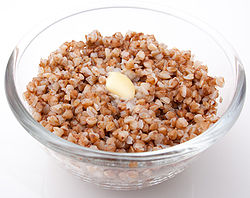
Back Qarabaşaq sıyığı Azerbaijani Boghvedegrød Danish Fagopira grio Esperanto Tatrapuder Estonian קאשה HE Հնդկացորենի շիլա Armenian Grikių košė Lithuanian Kasza gryczana Polish Гречневая каша Russian Гречневай хааһы SAH
 Buckwheat kasha | |
| Type | Porridge, oatmeal |
|---|---|
| Region or state | Eastern Europe |
| Main ingredients | Cereal (buckwheat, wheat, barley, oats, millet or rye) |
In English, kasha usually[a][b][c] refers to the pseudocereal buckwheat or its culinary preparations. In Eastern European cuisine, kasha can apply to any kind of cooked grain. It can be baked but most often is boiled, either in water or milk, and therefore the term coincides with the English definition of 'porridge', but the word can also refer to the grain before preparation, which corresponds to the definition of 'groats'. Kasha is eaten widely in Belarus (каша), the Czech Republic (kaše), Lithuania (košė), Poland (kasza), Romania and Moldova (cașa), Russia (каша), Slovakia (kaša), Slovenia (kaša), Kazakhstan, and Ukraine (каша), where the term, besides buckwheat, can apply to wheat, barley, oats, millet, rye and even rice. Kasha has been an important element of Slavic diet for at least 1,000 years.[1]
This English-language usage probably originated with Jewish immigrants, as did the form קאַשי kashi (literally translated as "porridges").[2]
-
Buckwheat with onions
Cite error: There are <ref group=lower-alpha> tags or {{efn}} templates on this page, but the references will not show without a {{reflist|group=lower-alpha}} template or {{notelist}} template (see the help page).
- ^ Molokhovets, Elena (1998). Classic Russian Cooking. Indiana University Press. p. 331.
- ^ Steinmetz, Sol. Dictionary of Jewish Usage: A Guide to the Use of Jewish Terms. p. 42. ISBN 0-7425-4387-0.
© MMXXIII Rich X Search. We shall prevail. All rights reserved. Rich X Search

